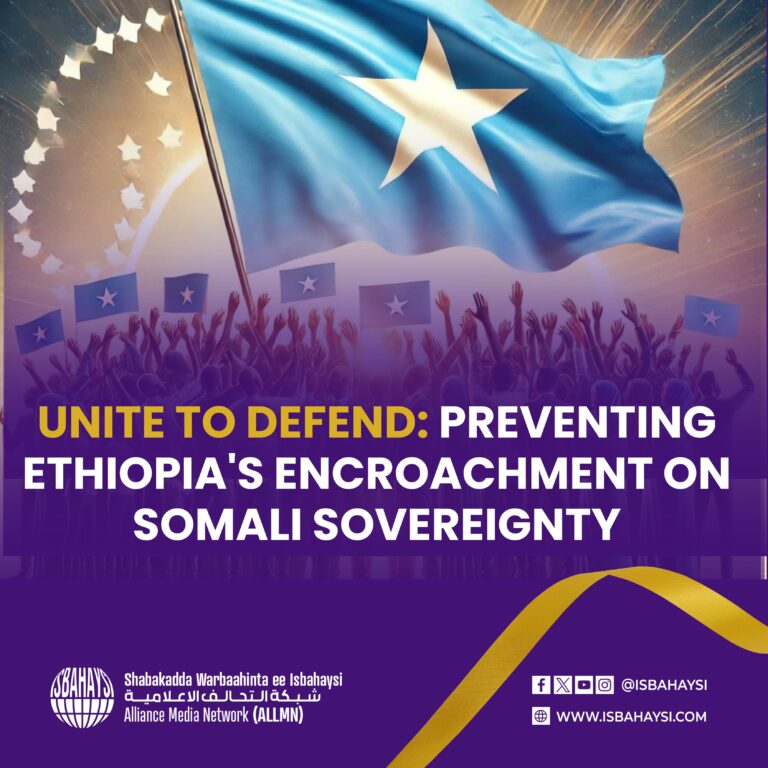
The core responsibility of any modern state is to defend its sovereignty and territorial integrity. For Somalia, this duty extends beyond safeguarding our coastal waters to protecting every inch of our land, including Somali regions currently occupied by Ethiopian troops under the false pretext of fighting Al-Shabaab. The appropriate response to this aggression is for Somalia to unite across all states and regions, mobilise volunteers, and train a new generation of defensive and offensive forces to counter this pressing threat. It is crucial that we set aside internal differences—whether related to the constitution, federalism, or resource sharing—and focus on the immediate priority of defending our nation against Ethiopian annexation.
The government must urge the African Union and the United Nations to exclude Ethiopia from the current ATMIS troops in Somalia and reject its inclusion in any future peace-building missions. Ethiopia’s actions go beyond merely seeking access to our sea or establishing a military base akin to those of China or the United States in Djibouti. Unlike these distant powers, Ethiopia shares a border with us and is a traditional adversary, posing a direct threat to Somalia’s sovereignty.
To effectively counter Ethiopia’s ambitions, the Hassan Sheikh Mohamud government must consider postponing the creation of divisions among Federal States and other projects, including the early election process, and concentrate on mobilising the population. This includes engaging communities in the Awdal region and rallying those who oppose the secessionist agenda in the northwest Somali region, particularly targeting the young population. The defence of Somalia’s land and sea must be the Somali government’s top priority.
Additionally, Ethiopia faces domestic issues, including civil conflict between the federal government and regions such as Tigray and Amhara. This presents Somalia with an opportunity to support Ethiopia’s opposition and arm them to wage war against the hardline government of Abiy Ahmed. This will give the Somali government time to prepare for the task and gain the upper hand against a weakened Ethiopia that seeks false unity through further encroachment on Somali territory.
The current Somali government’s approach of soft diplomacy is woefully inadequate given the gravity of the situation. This is not about negotiating an online project or rushing to submit a proposal like an NGO scrambling for funding—behaviour that might reflect the nature of President Hassan Sheikh’s and his Grand Ayatollah Faarah Abdulkadir’s experiences in the non-profit sector. This is about the very survival of our state. Allowing Ethiopia to dictate terms over Somali sovereignty is akin to letting an enemy decide the fate of one’s family—completely unacceptable.
All diplomatic negotiations with Ethiopia or third parties must end immediately. We have heard many times that the Turkish government will defend Somalia’s long coast and that a defence agreement was signed with the Turkish government. However, we’ve never seen the signed agreement, and it appears to have been more cosmetic than real. If that agreement were real, today we wouldn’t be facing Ethiopia’s continuous aggression toward our country. If the Turkish government is prepared to assist Somalia, we urge them to consider a defence agreement similar to their support for Azerbaijan, including building Somali military capabilities and providing sophisticated drone technology. This support will be crucial in avoiding war with Ethiopia and preventing further instability in the Horn of Africa.
Historically, Ethiopian leaders and their colonial allies have failed to conquer the Somali coast, even when Somalia was far weaker than it is today. Ethiopia’s current strategy appears to be achieving through political manoeuvring what it could not accomplish through centuries of warfare—without even firing a single bullet.
It is paramount that all federal state members mobilise special troops and make them ready for the disposal of the Federal Government if Ethiopian aggression goes beyond diplomatic solutions. Hassan Sheikh must understand that no country in history has defended its territory purely through diplomatic means. Diplomacy is used for managing state-to-state problems, not resolving existential threats.
If the Somali government fails to act swiftly, we risk a scenario reminiscent of the 19th-century conflict between Bolivia and Chile, where Bolivia lost its coastal territory and became landlocked. Ethiopia’s goal is not merely to gain access to the Somali sea but to establish a military foothold that could lead to further annexation of Somali territory.
The message to all Somalis is clear: We must set aside our differences and unite against this common threat. It is time to remove those who betray the nation by siding with Somalia’s traditional enemies. Unity is our strongest weapon, and through it, we can ensure that Somalia remains free, sovereign, and whole. The time to act is now, for the future of our nation and the generations to come.
_____________________
The author, Hussein Soyan, is a managing director of Soyan Financial Consultancy Ltd, a leading consultancy firm in East Africa, which specialises in Islamic finance solutions. X Twitter: @SoyanHussein